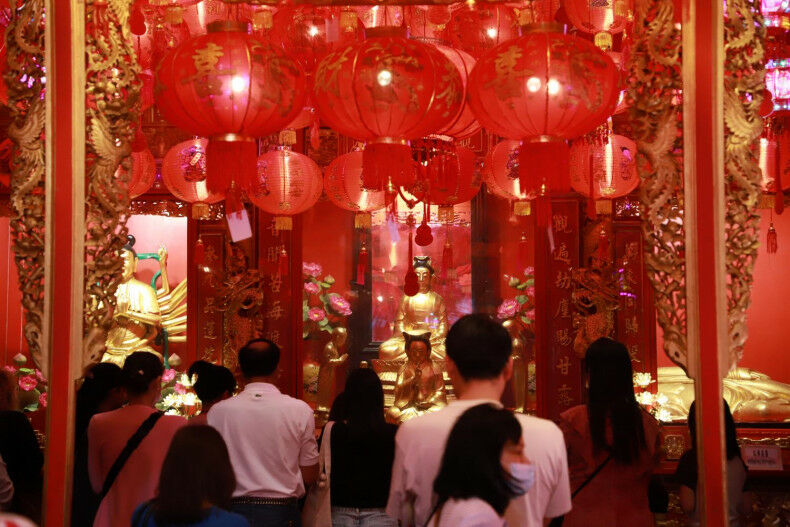Lunar New Year rituals at Bangkok’s dragon lotus temple draw Thai-Chinese community

Today marks the onset of the Lunar New Year, also known as the Year of the Dragon, a significant occasion for Thais with Chinese roots.
The shared belief of expelling impending misfortune, termed as fixing a cursed year or Pi Chong in Thai, strengthens the cultural ties between the two communities.
A customary practice during the Lunar New Year involves visits to Wat Mangkon Kamalawat, also known as Wat Leng Noei Yi, located in the Yaowarat area of Pomprap Sattruphai district, Bangkok’s Chinatown. This revered temple, one of the most frequented in the country, is a haven for Thais of Chinese descent to make merit and conduct rites to dismiss any omens of ill luck.
The name of the temple, Leng Noei Yi, translates to dragon lotus temple. It is anticipated to host even larger crowds during this year’s festivities.
Frequent visitor, Kanyarat Heman, shares her annual ritual.
“Every year, I come here at least once during the Chinese New Year festival. Since we’re unsure of what the future holds for us or our loved ones, making merit and thinking about good things [at the start of the New Year] gives us a sense of calm.”
For Kanyarat, making merit is a moment of reflection on the past year’s mistakes and a resolve not to repeat them. She regards the temple as sacred, a belief echoed by others who seek to make merit and wishes.
Temple bond
Visitor Somchai Charusomphon views the temple as an ideal place to perform rites to ward off inevitable misfortune. He visits twice a year to feel better and to exorcise any ill luck. His father, a Chinese immigrant, had settled here years ago, and he feels a strong bond with the temple.
Established during King Rama V’s reign, the Chinese Mahayana Buddhist temple is nestled in the heart of Yaowarat.
“Thais and Chinese are more like neighbours, so our temples share certain similarities.”
This year, he introduced a friend, Suraphong Sabaichit, to the temple. Suraphong was intrigued by the beautiful Chinese architecture of the temple, which he compared to an interesting art exhibition. The accessibility provided by the MRT underground electric train system made the visit more convenient, offering them more time to explore Yaowarat and savour the delicious street food, reported Bangkok Post.
Besides temple visits, some Thai-Chinese purchase talismans and gifts to dispel bad luck. A 60 year old man named Tony recently bought some dragon-shaped lanterns. He believes the Year of the Golden Dragon will bring him great fortune and good tidings.
Sirikarn Ratanopap bought an auspicious bracelet with a dragon pendant for good luck. She plans to honour her departed ancestors this Chinese New Year while spending quality time with her family.
Siripha Jamrunkit also purchased a dragon-themed accessory for good luck, believing this would be her lucky year. At the temple, she wished for her family’s health and happiness for the upcoming year.
Latest Thailand News
Follow The Thaiger on Google News:


























